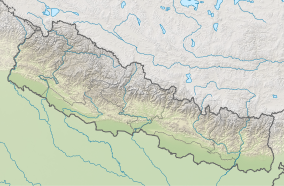Banke National Park is located in the Lumbini Province and was established in 2010 as Nepal’s tenth national park after its recognition as a "Gift to the Earth".[1] The protected area covers an area of 550 km2 (210 sq mi) with most parts falling in the Sivalik Hills. The park is surrounded by a buffer zone of 344 km2 (133 sq mi) in the districts of Banke, Salyan and Dang Deukhuri Districts.[2]
| Banke National Park | |
|---|---|
 Location in Nepal | |
| Location | Nepal |
| Nearest city | Kohalpur |
| Coordinates | 28°11′28″N 81°54′46″E / 28.1911°N 81.9128°E |
| Area | 550 km2 (210 sq mi)[1] |
| Established | 12 July 2010[1] |
| Governing body | Department of National Parks and Wildlife Conservation |
Together with the neighboring Bardia National Park, the coherent protected area of 1,518 km2 (586 sq mi) represents the Tiger Conservation Unit (TCU) Bardia-Banke.[3]
Vegetation
editThe vegetation in Banke National Park is composed of at least 113 tree species, 107 herbal species and 85 shrub and climber species. Common species include sal, axlewood, Semecarpus anacardium, khair, andTerminalia alata.[4]
Fauna
editThe protected area holds tiger and four-horned antelope.[5] In 2014, a ruddy mongoose was recorded for the first time in the protected area.[6]
References
edit- ^ a b c DNPWC (2010). Banke National Park Archived 2012-02-15 at the Wayback Machine Government of Nepal, Ministry of Forests and Soil Conservation, Department of National Parks and Soil Conservation
- ^ Bhushal, R.P. (2010). Nod to Banke National Park. Archived 2014-12-18 at the Wayback Machine The Himalayan Times, 13 May 2010
- ^ Wikramanayake, E.D., Dinerstein, E., Robinson, J.G., Karanth, K.U., Rabinowitz, A., Olson, D., Mathew, T., Hedao, P., Connor, M., Hemley, G., Bolze, D. (1999). Where can tigers live in the future? A framework for identifying high-priority areas for the conservation of tigers in the wild. Archived 2012-03-10 at the Wayback Machine Pages 255–272 in: Seidensticker, J., Christie, S., Jackson, P. (eds.) Riding the Tiger. Tiger conservation in human-dominated landscapes. Cambridge University Press, Cambridge. hardback ISBN 0-521-64057-1, paperback ISBN 0-521-64835-1.
- ^ Napit, R. (2016). Species Diversity, Forest Community Structure and Regeneration in Banke National Park. Nepal Journal of Science and Technology 16(1): 17–30.
- ^ Dhakal, M., Karki (Thapa), M., Jnawali, S. R., Subedi, N., Pradhan, N. M. B., Malla, S., Lamichhane, B. R., Pokheral, C. P., Thapa, G. J., Oglethorpe, J., Subba, S. A., Bajracharya, P. R. & Yadav, H. 2014. Status of Tigers and prey in Nepal. Department of National Parks.
- ^ Subba, S.A., Malla, S., Dhakal, M., Thapa, B.B., Bahadur, L., Bhandari, K.O. and Bajracharya, P. (2014). Ruddy Mongoose Herpestes smithii: a new species for Nepal. Small Carnivore Conservation 51: 88–89.
